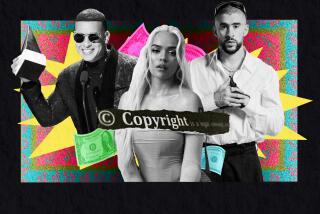Injunction Gives Napster 3 Days to Crack Down on Copyright Abuse
- Share via
Napster Inc.’s freewheeling days as a haven for music piracy were brought to an end Tuesday, as a federal judge ordered the popular service to block all copyrighted songs identified by the music companies.
The preliminary injunction, issued by U.S. District Judge Marilyn Hall Patel on Monday night, requires the major music labels to provide Napster with the song title, artist name, file name tied with the copyrighted tunes and proof that they control the copyright.
After that, the bulk of the work goes to Napster. The Redwood City, Calif.-based firm will have three business days to come up with a comprehensive plan for blocking unauthorized files.
Patel’s ruling is a clear victory for the record industry, which has long fought to protect its property in the booming digital marketplace.
But technology industry watchers say Napster salvaged a partial victory by avoiding a complete shutdown by the courts, although the ruling probably will squeeze the life out of the popular service. Napster officials said Monday they will work to comply with the injunction.
“We will continue to press our case in court and seek a mediated resolution even as we work to implement the court’s order,” Napster Chief Executive Hank Barry said in a statement. “We will continue to seek a settlement with the record companies and to prepare our new membership-based service.”
Patel’s long-awaited ruling ends the controversy, and confusion, about the fate of the popular company. Napster enraged the world’s largest record labels--EMI, Warner, Sony, Universal and BMG--in 1999, which filed a copyright suit against the company, claiming that its song-swapping technology was eating away billions of dollars in lost sales.
Patel initially ruled in favor of the record companies last year, but that decision was later appealed.
The 9th Circuit Court of Appeals, insisting that Patel refine her decision, ultimately ruled that Napster could be held liable for copyright infringement and that an injunction was warranted.
In a bid to buy time, Napster on Sunday began blocking access to thousands of copyrighted songs to show its good intentions to both the court and the music industry. Yet its blocking effort was plagued with holes, allowing fans to circumvent the filter by saving their MP3 music files with slightly misspelled song titles and band names.
Fans have stored tracks by the rock band Metallica, for example, under the name Matallica.
Late Monday, both sides were surprised to learn that Patel had issued her ruling. In it, she stated that copyright holders--which include the record labels and music publishers--would not have to pinpoint the name of every duplicated audio file that Napster users are swapping.
They only have to give the information once per song, placing the onus on Napster to clean upits own system.
That is important, considering there are more than 64 million Napster subscribers, and each person can save his digital music files under any name.
Napster has until Monday to outline how it will police its network, and whether it will be able to comply with the injunction.
“We’re going to make sure that there is a full catalog of our members’ copyrighted works” for Napster to block, said Hilary Rosen, president of the Recording Industry Assn. of America, the music labels’ largest trade group.
Just a year ago, many industry watchers questioned whether copyright law was either outdated or outright dead in the “new economy,” where the rise of high-speed Internet access in the home sparked a boom of online bootlegging.
But with the federal rulings in the Napster case, legal experts say it is clear that copyright law must provide strong protection for intellectual property.
“There is no doubt that this is a landmark case that gives a pretty good road map to address future cases,” said Jeffrey Knowles, chief litigator for the music publishers in the Napster case.
The record companies may be winning the legal battles, but they’re under mounting pressure from lawmakers to satisfy the online demand that Napster stoked. Sen. Orrin G. Hatch, the Republican from Utah who chairs the Senate Judiciary Committee, has urged the labels to get moving on deals and has offered to act as a peacemaker between Napster and the labels.
The committee has scheduled a hearing for April 3 to explore online music issues. Influential members of Congress also are urging the music industry publicly and privately to strike deals with online upstarts.
“This battle will go on and on and on until the recording industry finds a way to live in harmony with this new technology,” said Rep. W.J. “Billy” Tauzin, the Louisiana Republican who chairs the House Energy and Commerce Committee, at a conference on copyright issues in Washington on Tuesday.
Indeed, Napster’s legal woes continue to mount. The National Academy of Recording Arts & Sciences, the producers of the Grammy Awards, filed a copyright infringement suit Tuesday that mirrors ones filed by the record labels. The academy is seeking to block Napster users from swapping recordings of live performances aired at last month’s awards show. The academy said it owns the rights to the works and has applied to copyright them, according to court filings. Napster officials late Tuesday declined to comment on the complaint.
More to Read
The biggest entertainment stories
Get our big stories about Hollywood, film, television, music, arts, culture and more right in your inbox as soon as they publish.
You may occasionally receive promotional content from the Los Angeles Times.











